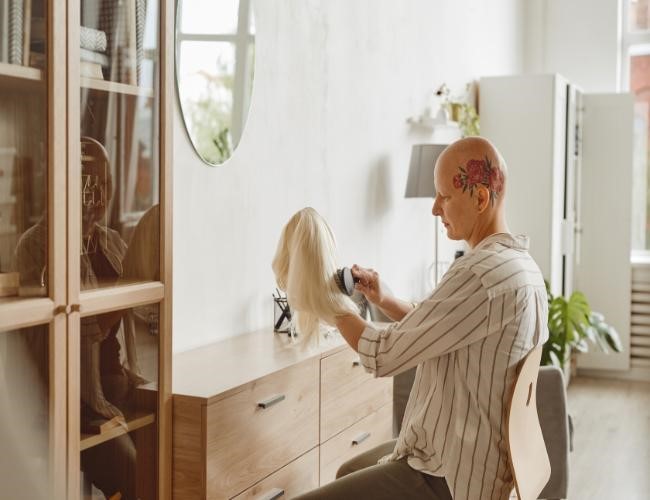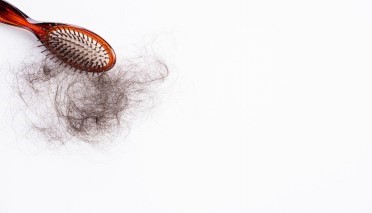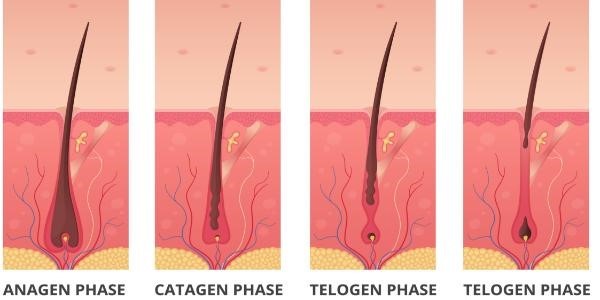Has this ever happened to you? While washing your hair you run your hands through it. Then you are horrified to notice that your hands are completely covered in your hair. The hair catcher over the shower drain is full of hair after your shower. When you brush your hair you are upset, the brush is full of your hair. It is very distressing to see your hair falling out and your once full head of hair thinning. Our self-image is very connected to our hair.
Hair loss in women is more common than most people realize. It is estimated that about 50 percent of women suffer from excessive hair loss. But why does this happen? What are the types of hair loss? Is there a treatment to help stop hair loss and promote hair regrowth?
Hair growth cycle
Hair goes through a growth cycle that can last a couple of years to about six years. The growth cycle has four phases that each last a different amount of time. Let us look at the hair cycle.
- Anagen phase-This is the active growth phase of a hair, it can last 2 to 6 years.
- Catagen phase-This is a transitional phase. Hair growth stops and the hair root begins to shrink. This phase lasts about 3 weeks.
- The telogen phase-This is the resting phase. Hair has stopped growing and it is at rest. This phase lasts about 3 months.
- Exogen phase-This is the last phase. This is also called the “shedding phase.” Hair falls out during this phase. Normal hair shedding is up to 100 hairs per day. Losing more than 100 hairs per day is excessive.
Types of hair loss
- androgenetic alopecia is the most common type of hair loss. In women, it begins on top of the head. The part begins to widen over time. This type of hair loss is due to both genetic and hormonal causes. There is also a genetic component to this type of hair loss. Hormones called androgens increase in one’s body and cause changes to hair follicles and the hair falls out. These changes to the hair follicles cause the hair that grows back to be thinner and shorter than it was before.
Treatment options
When considering treatment options it is best to discuss them and possible side effects with your doctor or dermatologist. Some treatment options are:
- Minoxidil 2% or 5%, bought over the counter helps some women. Usually the first treatment option. Continue treatment forever if it is working or your hair will continue to thin.
- A combination of ketoconazole shampoo and prescription medication spironolactone may promote hair growth in some women.
- Hair transplant, hair is taken from an area where it is growing and moved to an area where it is not.
- Laser therapy. Has shown promise to stimulate hair growth in some women.
- Telogen effluvium the second leading cause of hair loss is due to some type of illness or stressor to a person’s body. Often people do not connect the illness or stressor with the hair loss because the hair loss doesn’t start until about 3 months after the event.
I started losing my hair, I did not know why. I started doing research and reading about this type of hair loss. I then realized that the hair loss began about 3 months after I had covid 19. Due to the stressor more hairs than usual enter the telogen phase at one time and then the shedding phase.
This type of hair loss usually lasts 8 months or less. Hair usually thins but then grows back without any need for treatment. If your hair doesn’t grow back after 8 months, you should consult your doctor. Other types of stressors that can cause hair loss.
- Childbirth
- Menopause
- Restrictive diets
- Surgery
- Medication side effect
- Hypothyroidism
- Stress
- All viruses
- Bacterial infections
- Low iron level
- Other conditions that affect hormones

- Anagen effluvium is a loss of hair during the growth phase of the hair cycle. The hair shaft becomes thinner and the hair breaks off. With this condition, hair loss happens rapidly. This type of hair loss is caused by a toxic chemical. Radiation and chemotherapy often cause this anagen effluvium. Other causes are heavy metal poisoning or severe malnutrition. Most often after the toxic assault stops the hair will grow back.
- Alopecia Areata is a hereditary autoimmune condition. White blood cells attack hair follicles causing them to shrink and produce less hair. It causes an inflammatory response. Hair falls out in patches most often and the hair loss comes on quickly. For some people, it may happen one time and the hair grows back.
Other people may be significantly affected. Having many episodes over their lifetime. A small number of people may lose all the hair on their head or all or most of the hair on their body. Using a wig and penciling in eyebrows can be helpful to a person’s self-image.
There are support groups that offer emotional support for this condition at the National Alopecia Areata Foundation. Some treatment options are:
- Corticosteroids
- Minoxidil
- Topical immunotherapy
- Traction alopecia in this condition, traction is the cause. Hair pulled tight can damage the hair follicle and cause sores on the scalp. Certain hairstyles cause this such as braids, ponytails, and hair extensions.
Avoiding these types of hairstyles can prevent or reverse this type of hair loss. If hair does not grow back within a short time, try minoxidil. If you are losing more than 100 hairs a day. You likely have one of the five types of hair loss we discussed.
Some conditions will be temporary and others will not. It is important to discuss the hair loss with your doctor. To rule out any medical conditions or medication side effects that can cause hair loss. A dermatologist can diagnose the type of hair loss that you have and discuss treatment options with you.

Seeking treatment early may help you have a better outcome. Do not be afraid to reach out for emotional support for your hair loss by contacting a therapist in your area or contacting a therapist in your area or contacting a support group.

